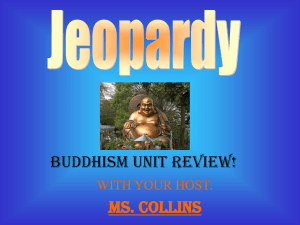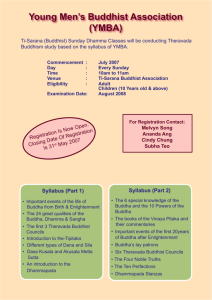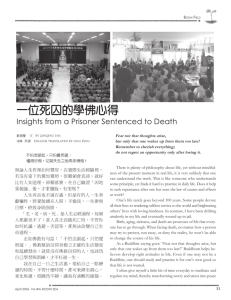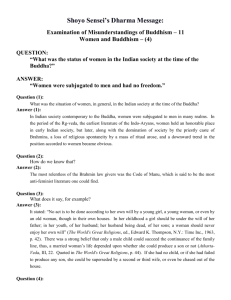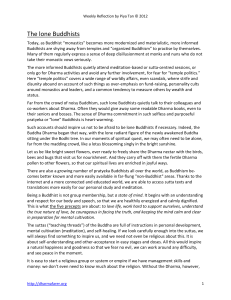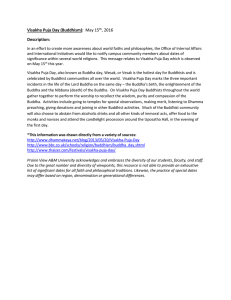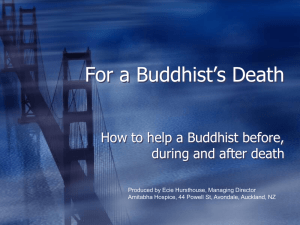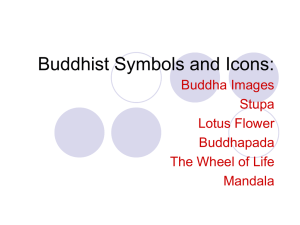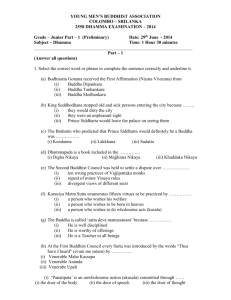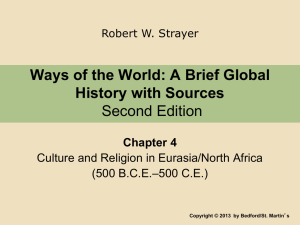The Buddha as a CEO
advertisement
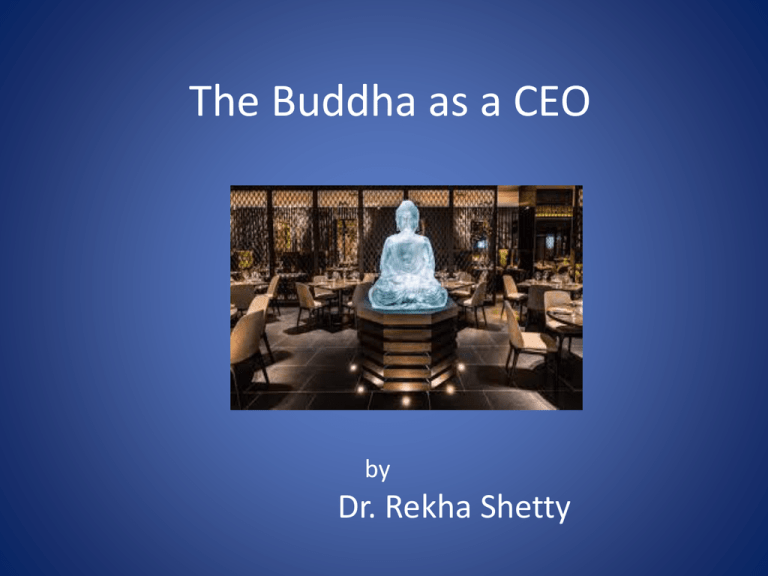
The Buddha as a CEO by Dr. Rekha Shetty How cool it would be to spend your time thinking of lovely new ways to inspire more joy and happiness in the people around. Looking at the opposite of conventional wisdom is future vision. Analyze carefully before acting. For Buddhists, the Buddha is a model who provides inspiration. He walked the same path we walk and overcame many obstacles to attain enlightenment and free himself from the confusion that is samsara. Unity is Strength • Gandhiji’s greatest fear was that he would hate the British. • Nelson Mandela worried that he would hate his oppressors. • The Buddha asks us to see the divine radiance, the ‘Buddha’s nature’ in the face of a leper and a legend. • In tennis everything starts with “Love All”. In business, this concept can revolutionize the organization. • Many Buddhists will avoid professions which involve deceit, exploitation, killing, harming health ‘When you work, you are a flute in whose heart the whispering of the hours turn to music. To love life through labour is to be intimate with life’s most intimate secret. All work is empty save when there is love, for work is love made visible.’ – Kahlil Gibran The Buddha’s advice on livelihood • Be professionally skilled, efficient, energetic and learned. • Work hard to protect your income and sustain your family. • Keep the company of faithful friends and seek spiritual betterment together. • Live within your means. • Do not take away what others have legitimately earned. Giving is the best communication A Buddhist Approach to management Buddhism has its own unique management theory. It had a well-developed administration system. It had been that Buddhist Sangha communities were organizations which excelled in managerial skills. Loving kindness or metta Invest in the give based economy. Abandon the take based economy. ‘what’s in it for me?’ model. Compassion or karuna To feel the pain, joy and aspiration of others in your own heart. To feel this even about your enemies. The Dalai Lama once said that his greatest fear was not being able to feel compassion for the Chinese. Appreciative joy or mudita Replacing envy with ecstasy. Feeling the happiness of a plant as you water it. Enjoying the thirst-quenching thrill of a bird sipping water from a bath you have set up. Equanimity or upekkha Inviting the possibility that every person in every position is your teacher. What could a janitor teach a Nobel-winning physicist? What could a short order cook teach a global CEO? What could a child in the playground teach a world-class athlete? Restaurant Buddhist Principles Every CEO can apply • • • • • Working together Communicating effectively Encouraging every team member Sharing ideas selflessly Thinking as a single unit • • • • • • Equality under the Dharma Decentralized leadership: Shared support and responsibility: Mutual respect and harmony: Communication and interaction Democratic governing Implementing Buddhism Principles in Business • Work provides a major opportunity to engage with the world. • Alisha, a Mahayana mind trainer in Tibet, could mend shoes. • Conflicts do arise in protecting the family’s means of support and cutting costs • Do not compromise on the quality of the product. • Dharma is to be practised every day—keeping a secret, guarding another’s reputation, paying full attention to one’s work even when worried. To carry out small acts of consideration even on Wall Street Caring about your customers, speaking the truth, sharing your gains with employees . . . each of these and more, you can practice on the floor. ‘The heaviness of being successful was replaced with the lightness of being a beginner again.’ - Steve Jobs Death is very likely the single best invention of Life. It’s Life’s change agent. Innovative Idea Top 10 Buddhist Celebrities * Tiger Woods * Tina Turner * Leonard Cohen * Richard Gere * Steven Seagal * Orlando Bloom * The Dalai Lama * Herbie Hancock * Kate Bosworth * Aung San Suu Kyi Think of the give-based economy • To measure the exact impact of loving kindness, compassion, appreciative joy and equanimity, on the corporation. • The Buddha says simply that all living beings are interconnected. Everyone is a part of our being • In business, one believes in retaining the competitive edge, getting what is most profitable for you, sometimes at the cost of customers, employees, and even the country. • Winning is being street-smart, aggressive and ‘me-oriented’. • If you were to turn this upside down and work to bring maximum joy to everyone around you by loving and giving rather than taking, imagine how everyone would support and help you, and what energy they would bring to their jobs. All is well Please contact author at Email :rekhashetty123@gmail.com Tel: 044 26260313 Website: www.mindspower.com, http://innovation90days.blogspot.in/ http://thehappinessquotient123.blogspot.in/ Twitter:@drrekhashetty

